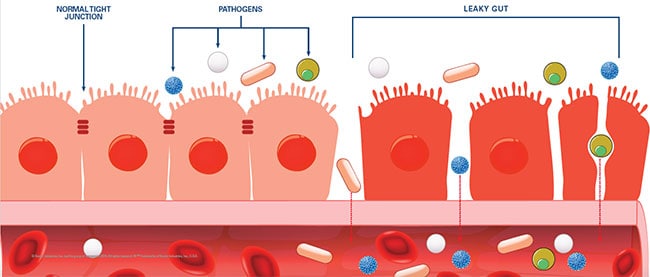Transforming a Leaky Gut to a Healthy One
- Topics: 2022 EquiSummit, Article, Digestive System, Horse Care, Nutrition

Preventing the flow of bacteria and associated toxins through leaky “tight junctions” might not be completely possible due to modern horse keeping practices. Being mindful of factors that tip the scale in favor of snug tight junctions, however, allows us to better manage leaky gut syndrome for improved horse health.
Only a single layer of cells forms the gut lining, creating a barrier between the contents of the gastrointestinal tract and the horse’s circulatory system. In well-managed, unstressed horses, protein structures called tight junctions hold those cells together, explained Anthony Blikslager, DVM, PhD, Dipl. ACVS, a professor of equine surgery and gastroenterology at North Carolina State University’s College of Veterinary Medicine. Blikslager was an invited speaker at the second annual Kemin EquiSummit virtual event held May 25-26.
“When the tight junctions break down, the gut is said to be leaky because there is a microscopic separation between individual cells,” Blikslager explained. “The contents of the gastrointestinal tract—including bacteria—then seep between the cells, entering the horse’s bloodstream.”
“Some leakage is normal and allows the horse to absorb nutrients and water. Too much leakage, however, leads to health problems,” he added.
Signs of a leaky gut include the following:
- Behavior changes;
- Poor performance;
- Weight loss;
- Insulin resistance and equine metabolic syndrome;
- Loose manure or changes in manure consistency;
- Skin allergies;
- Chronic or recurrent colic; and
- In severe cases, laminitis.
Four key factors can contribute to a leaky gut: diet, environment, performance, and medications—particularly non-steroidal anti-inflammatory drugs (NSAIDs).
“Diets that have a lot of hay variability or quality and a skewed ratio of hay to concentrate feed (grain) contributes to leaky gut,” Blikslager said. “In addition, stresses in the horse’s environment due to shipping, changes in their surroundings or social networks, as well as high levels of training or competition, predispose horses to leaky gut.
“As owners, we need to do some of the things that we know can precipitate leaky gut because we have horses that are expected to perform,” he added. “In such cases, we have to ask ourselves, ‘What can I do to minimize the consequences of leaky gut and allow the gut to heal?’”
Restoring a leaky gut can be achieved though management and avoiding situations and conditions we know result in a trend toward leaky gut. This could include increased stall time, intense competition, poor-quality hay or too much grain, or even a sudden change to a high-quality hay such as alfalfa. Instead, try to maximize turnout, find different ways to train a horse (e.g. longeing one day, intensive training the next day, then trail riding the next), and feed to condition and build off a forage-based diet, as well as minimize changes in diet.
“Any little change an owner can make will help minimize leaky gut, realizing that horses evolved to graze and exercise daily for 18 hours,” Blikslager said. “This would equate to building the diet on forage first, concentrate for added condition, and turnout or lower-level exercise as part of the horse’s daily and weekly routine.”

Written by:
Stacey Oke, DVM, MSc
Related Articles
Stay on top of the most recent Horse Health news with












